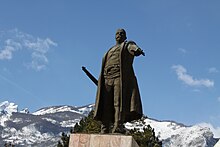Bajram Curri
Bajram Curri (* 1862 in Yakova , Ottoman Empire , † March 29, 1925 in Dragobia , Tropoja County , Albania ) was an activist of the Albanian national movement .
Curri campaigned as a gang leader for the interests of the Albanians in the Ottoman Empire and successfully fought against the Young Turks in 1912 . During the First World War he led a guerrilla force. In the newly established state of Albania , he held posts in various governments as a minister and as a commander in the army . As an opponent of the later King Ahmet Zogu , to whom the Kosovar question was less important, he was persecuted by his troops and then encircled in the northern Albanian Alps . He shot himself on March 29, 1925 to avoid capture.
The Albanian communists upheld his reputation as a nationalist and freedom fighter and named the city of Bajram Curr after him.
Bajram Curri was married and had two daughters. The family lived in Shkodra after they had to flee Kosovo.
literature
- Burhan Çiraku, Muin Çami (Ed.): Bajram Curri. Trajtesa e documents. Akademia e Shkencave e RPSSH, Instituti i Historisë, Tiranë 1982, OCLC 21591761
- K. Lange: Curri, Bajram . In: Biographical Lexicon on the History of Southeast Europe . Volume 1. Munich 1974, p. 344 f.
Individual evidence
- ^ Stan Sherer, Marjorie Senechal: Long Life to Your Children! A Portrait of High Albania . The University of Massachusetts Press, Amherst 1997, ISBN 1-55849-096-5 .
| personal data | |
|---|---|
| SURNAME | Curri, Bajram |
| BRIEF DESCRIPTION | Albanian freedom fighter |
| DATE OF BIRTH | 1862 |
| PLACE OF BIRTH | Gjakova |
| DATE OF DEATH | March 29, 1925 |
| Place of death | Dragobia , Tropoja district |
